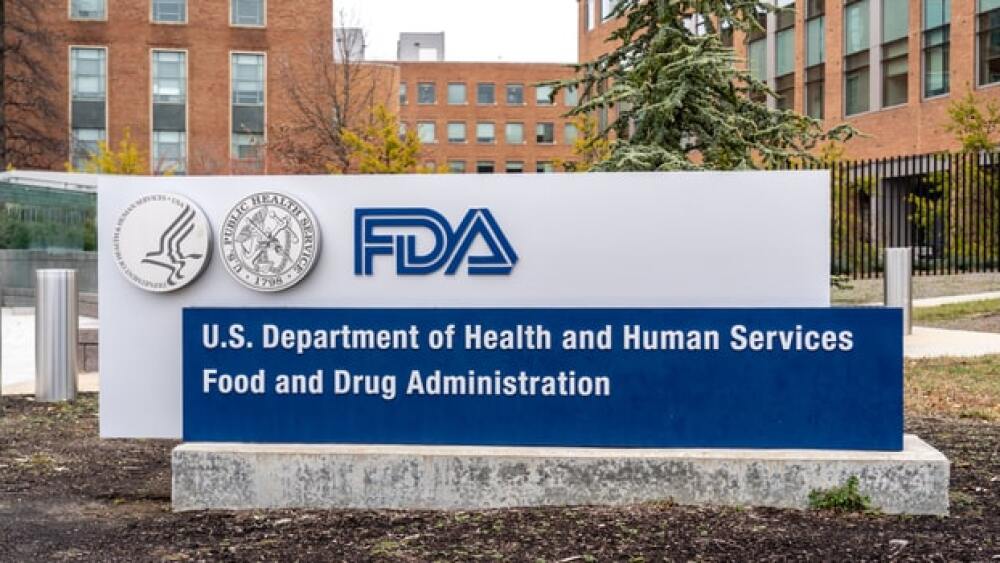Thursday, the FDA greenlit Ostuka and Lundbeck’s Rexulti as the first treatment in the U.S. for agitation associated with dementia due to Alzheimer’s disease.
Pictured: FDA Headquarters/Courtesy of Getty Images
Alzheimer’s patients and caregivers have another tool in their arsenal after the FDA approved the first treatment for agitation associated with dementia due to the memory-robbing disease.
Rexulti (brexpiprazole), developed by partners Ostuka Pharmaceutical and Lundbeck, was first approved in 2015 as an adjunctive therapy to antidepressants for adults with major depressive disorder and as a standalone treatment for schizophrenia.
The supplemental approval makes Rexulti the first and only therapy on the U.S. market for agitation associated with dementia due to Alzheimer’s disease.
Otsuka President Makoto Inoue called the approval “a major milestone” for patients, caregivers and families of Alzheimer’s patients with the condition, which affects approximately half of people with Alzheimer’s dementia and is associated with earlier nursing home placement, according to a joint statement released by the companies.
Original article, published April 17:
FDA Adcomm Votes in Favor of Rexulti for Agitation in Alzheimer’s
An FDA advisory committee voted 9–1 to approve Lundbeck Pharmaceuticals and Otsuka Pharmaceutical‘s brexpiprazole (Rexulti) for treating agitation associated with Alzheimer’s dementia (AAD) Friday.
Rexulti is an atypical antipsychotic, a drug type for which the FDA issued a Boxed Warning in 2005 due to a meta-analysis that revealed a 70% increased risk of death among elderly patients. Rexulti is approved for schizophrenia patients ages 13 and older and as an adjunctive therapy for major depressive disorder.
The committee’s decision is based on data from three Phase III studies suggesting that the benefit of treating AAD with the drug offset the 60-70% increased risk of death included in the drug’s warning label. Two studies showed the drug reduced agitation, based on the Cohen Mansfield Agitation Inventory, over a 12-week treatment period. The third found that flexible dose brexpiprazole did not significantly improve CMAI scores over the same time frame.
Eight deaths occurred out of the 655 participants (1.2%) on the drug, compared to one death of the 388 (0.26%) on placebo over the course of the studies.
Members who voted in favor pointed to the great need for effective treatment in this space and said the studies were well done with data that can inform providers and patients of the inherent risks.
The solitary “no” vote came from Kim Witczzak, co-founder of Woodymatters, a drug safety advocacy group. She said the data demonstrated didn’t outweigh the risk profile.
“I do agree that it is an unmet need, and I hope I’m proven wrong in time. But with this limited amount [of data], I’m not willing to vote yes for this product,” she said.
The FDA is not bound to the committee’s recommendation, but the agency often follows it.
Currently, there are no approved drugs for treating AAD, but often, atypical antipsychotics like Rexulti are prescribed off-label. Janssen Pharmaceuticals’ risperidone (Risperdal) is licensed for agitation in Europe but not the U.S., as it has been linked to a higher probability of cerebrovascular events in elderly patients with dementia.
“Right now, there is no standard of care,” said PCNS panelist David Weisman, M.D., of the Abington Neurologic Associates Clinical Research Center in Pennsylvania. “There’s this witches’ brew of every medication, every intervention that you could imagine being used . . . It’s a mess.”
The committee did not recommend a specific patient population with AAD for prescribing brexipaprazole, only emphasizing that it is not appropriate for patients with either mild or severe symptoms of agitation.
If approved, Rexulti would be the first FDA-approved treatment indicated for AAD in the U.S. The FDA has a PDUFA target action date of May 10. Rexulti is Lundbeck’s top seller, pulling in $572 million in 2022 for the Danish company. Analysts believe adding an AAD indication to the label could ramp up sales by another $500M.
Kate Goodwin is a freelance life science writer based in Des Moines, Iowa. She can be reached at kate.goodwin@biospace.com and on LinkedIn.






